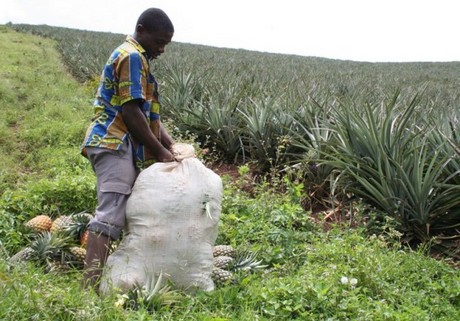 r farmers like Benard Mugume - who for many years grew bananas - have switched largely to pineapples. The reasons: the high potential profit from organic pineapples, and losses from banana pests and diseases such as banana wilt.
r farmers like Benard Mugume - who for many years grew bananas - have switched largely to pineapples. The reasons: the high potential profit from organic pineapples, and losses from banana pests and diseases such as banana wilt. "Pineapples as a cover crop have helped me protect the soil from erosion,” Mugume told Thomson Reuters Foundation. Cover crops are grown to conserve biodiversity, soil fertility and water. Mugume also mulches and makes contour ridges on the mountain slopes where he grows his pineapples, to reduce water run-off. Following the right growing practices is essential for realising the benefits, he adds.
Mugume - one of around 200 farmers in Ntungamo District who grow organic pineapples - says pineapple dollars have also allowed him to diversify into livestock breeding. He feeds his cows with pineapple pulp, and uses manure to fertilise his three-acre pineapple garden in line with organic principles prohibiting the use of chemical fertilisers.
According to the National Organic Agriculture Movement of Uganda (NOGAMU), most of Ntungamo’s organic pineapples are sold as fresh fruit on roadsides and in local markets for about $0.25 each during peak season, and double that in the off season.
Around two thirds of the 179 farmers registered with the local “Pineapple Innovation Platform” have applied for organic certification through NOGAMU. The platform enables farmers, extension workers, traders, processors, buyers, researchers and NGOs to share knowledge and support agriculture development.
In Ntungamo, the innovation platform came up with the idea of supplying dried pineapple and fresh juice, now produced only at a low level due to poor market access. Some farmers travel up to 25km to sell their pineapples to traders from neighbouring Rwanda.
"If sold as certified organic in niche markets, pineapples fetch better prices," said Irene Kugonza, a standards and certification officer with NOGAMU. They are certified to the East African Organic Products standard, she added. Furthermore, organic pineapple supply chains are free of middlemen, meaning that farmers get most of the money, Kugonza adds.
The Uganda Investment Authority estimates pineapple production at 5,000 acres spread across 2,500 smallholdings. Uganda is considered to be the largest producer and exporter of internationally certified organic fruit and vegetables in Africa.
According to Moses Sabiiti, coordinator for the National Agricultural Advisory Services (NAADS) in Ntungamo District, organic pineapple farmers will get a financial boost from tapping export markets for pineapple juice and dried fruit.
Uganda has 44 companies that export organic produce, of which 11 export organic-certified fresh, pulped, frozen and solar-dried pineapple mainly to the European Union, United States, Japan, Kenya, Rwanda, South Sudan and United Arab Emirates. One Ugandan firm, Fruits of the Nile, buys fresh organic pineapples for processing into dried fruit that is sold in Britain.
"Some producers in areas traditionally devoted to bananas are moving to pineapples (because of) reduced water availability,” Gondolini said. “The other main driver is the market price, which is significantly higher for pineapple."





